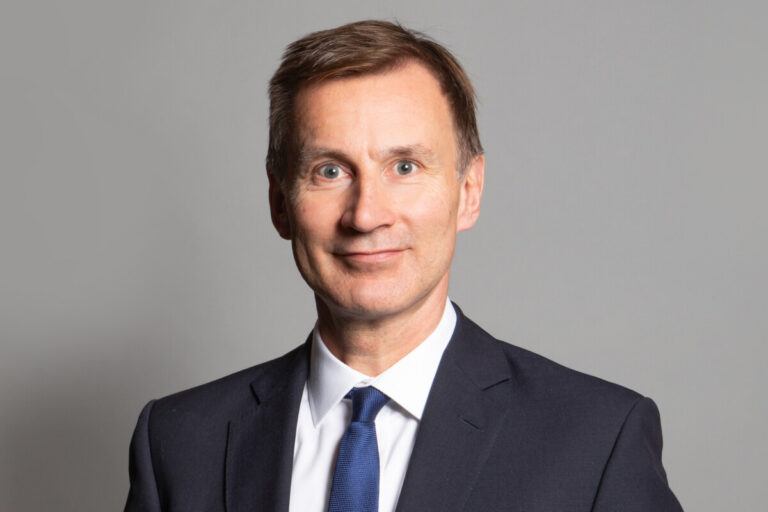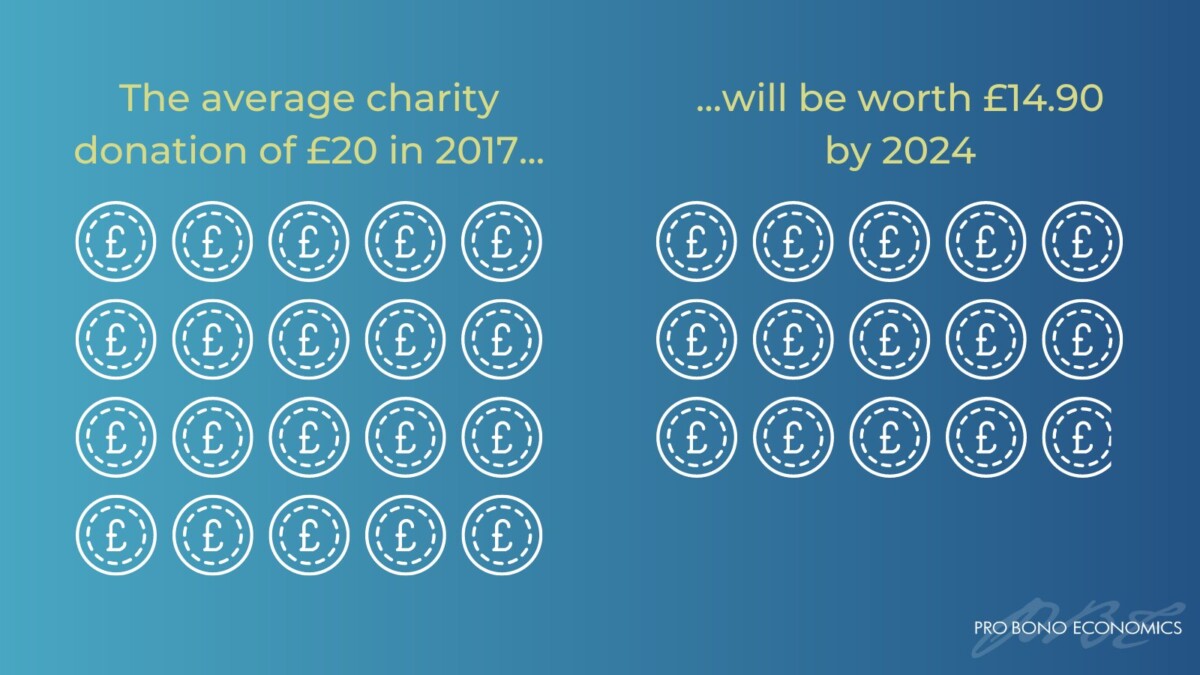‘Little to change the reality on the ground’ – Autumn statement

The Autumn statement has been met by disappointment from the charity sector, with leaders calling it ‘disappointing’, with ‘little to change the reality on the ground’, no support for charities, and income forecast to drop £2.2bn in real value.
Chancellor of the Exchequer Jeremy Hunt delivered the autumn statement this morning, announcing – amongst other things – an increase to the energy price guarantee to £3,000 for a typical household (up from the current £2,500), and a range of tax threshold freezes for a further two years, on top of the existing four-year freeze, taking us to April 2028.
Hunt did confirm ongoing support for households and businesses with their energy costs but said the scale of support would be lower. The statement can be read here.
Advertisement
Sector response
Pro Bono Economics released its same day analysis, estimating that charity income will rise by around £1bn in cash terms during 2023-24 (1.6%), but if costs rise in line with broader inflation then the real value of that income for the charity sector will decline by £2.2bn over that time period. This, it says, is roughly a 4% real terms decline from the expected level for 2022/23. It also noted that a social recession would affect volunteering rates, exacerbating a problem that already exists post-pandemic where charities have not yet recovered from the pandemic’s decline in formal volunteering.
Matt Whittaker, CEO of Pro Bono Economics said demand for charity support during the recession and cost-of-living crisis will be substantial and that the sector needed strategic investment both now and into the future:
“The government has taken important steps to protect the most vulnerable in the Chancellor’s Autumn Statement, but benefit uprating will not kick in until the spring and timelines for additional payments are still unclear. Charity demand is already rocketing and will only intensify as we head into winter. Given the enormous pressure on public spending and household budgets, charity income will inevitably dip as people have less to give and government funds are stretched.
“Based on these OBR figures, we estimate charity income will decline by £2.2 billion in real terms by the end of 2023/24. This all comes on the tail of unprecedented upheaval resulting from the pandemic, which has seriously weakened the charity sector’s resilience and ability to cope with increasing pressures from inflation.
“Through the worsening economic headwinds in the coming months, charities will continue to support the most vulnerable and aid those left stranded by public service backlogs and delays. But the sector will need strategic investment now and in the long-term to weather this storm and future crises.
“The sector’s potential as a partner to government should also not be ignored. Given the vital role that charities play in getting people back to work, government will benefit from close engagement with the sector in its review of economic inactivity. It is also important the sector is engaged with the Energy Efficiency Taskforce, especially considering the challenges faced by smaller community groups in investing in energy efficiency.”
Neil Heslop OBE, Chief Executive of the Charities Aid Foundation, said it was disappointing that there was no support for charities:
“Charities are at the frontline of the cost-of- living crisis helping those most in need- providing warm places, food packages, mental health services, and support for the homeless. So it is disappointing that the Chancellor did not mention any support for charities. These organisations are under severe financial strain, facing soaring energy bills, declining income as people cut back, but significantly rising demand for their services. Charities must be at the centre of any continued energy support from April and need to know where they stand.”
Tony Armstrong, CEO of Locality, said there was little to help with the cost of living crisis:
“The Chancellor’s Autumn Statement was designed, he said, to ‘tackle the cost of living crisis’. But for community organisations on the front line, there is little here to change the reality on the ground right now.
“Charities and local groups have been working tirelessly to support their communities with food banks, warm spaces and money advice – all while their own costs continue to skyrocket.
“Uprating benefits in line with inflation and continuing the emergency Household Support Fund will provide important help for those who need it most. But to ensure people can continue to access vital local support, the government should extend energy bill relief for community organisations after April, and prioritise them in the welcome drive for energy efficiency. We need our front line local organisations now more than ever, not just to get people through this crisis, but also to build a hopeful future for our communities.”
Stephen Muers, CEO, Big Society Capital said the government needs to be creative in how it responds if it is to achieve the stability, growth and support for public services:
The Chancellor today was right to acknowledge the pressure on the public purse and the challenges that this creates for the government. To achieve the stability, growth and support for public services he set out, the government will need to be creative in how it responds.”
“He called for ‘better outcomes for citizens and better value for taxpayers’ – and we couldn’t agree more. Social Outcomes Contracts are well-proven examples of mechanisms which can target prevention of social issues with a greater level of success and reduced public cost.”
“After a decade of evidence, they have been shown to combine impressive social impact with lower public spending, saving the taxpayer £3 for evert £1 spent by government according independent research published by Big Society Capital earlier this year. With the trailblazer devolution deals putting local people first, outcomes commissioning can allow government to focus on preventive services to unlock long-term prosperity.”
Simon Starling, director of policy, advocacy, and research at Bond, called for an urgent increase to UK aid:
“The Chancellor has ruled out restoring UK aid to 0.7% GNI, breaking the Conservative manifesto commitment. We hope the Chancellor’s reference to a budget of “around 0.5%” reflects an intention to increase UK aid above the artificial ceiling, which would be welcome. Marginalised communities facing climate change, conflict and poverty need to see a clear commitment from the UK government that it will deliver on its promises and demonstrate “compassion, dignity and fairness”. Additional resources to cover the costs of hosting refugees in the UK is welcome, but the government must urgently increase UK aid and begin a return to 0.7%.”
Sarah Vibert, NCVO CEO, said the government’s plans would widen inequalities in communities:
“The Chancellor’s statement sets out a sobering picture for the economy in the next few years. Through not rectifying the impact of austerity over the past decade and not addressing the root causes of food and fuel poverty, the measures announced today will lead to poorer outcomes and widening inequalities in communities. This is combined with a commitment to further squeeze public services, which will have a devastating impact on people, communities, and the voluntary sector.
“There is a wealth of evidence which demonstrates the power of investing in communities, not least for driving economic growth and reducing regional inequality. This has not been fully acknowledged and human wellbeing is not being prioritised. We’re calling for the government to urgently undertake and publish an equality impact assessment into these measures before implementation.
“Although uprating some benefits in line with inflation next spring will be a lifeline for many people, it will not come soon enough to prevent people facing poverty this winter. And who will be expected to pick up the slack? Charities and volunteers.
“The voluntary sector is a critical part of social infrastructure and has been essential in supporting society through recent crises. From preventing isolation and helping vaccinate millions of people against covid-19, to setting up ‘warm hubs’ and relentlessly gathering food to distribute to people who otherwise would go hungry this winter.
“I know that NCVO members have been asking themselves if we are letting government off the hook this winter, by stepping up and plugging the gaps in underfunded public services. Clearly charities are not going to walk away from communities at a time of need. But they cannot be taken for granted. NCVO members are making really tough decisions about what they can and cannot do. Many were forced to spend reserves to survive the pandemic and are now on the verge of buckling under the compounding pressures of increased demand, skyrocketing operational costs, eroding income, and challenges recruiting staff and volunteers.
“Energy costs will remain a major concern. People who are struggling already will be worried about paying their bills when the energy price guarantee rises in April. Many more people are likely to seek support from charities. Voluntary organisations are also struggling to plan for the coming years without any certainty about future energy costs. Further government support will be needed for those most in need and the organisations that are supporting them.
“Cutting funding for public services will only exacerbate these challenges. Charities are vital partners in the design and delivery of public services, but charitable income cannot replace government funding.
“At NCVO, we will continue working with voluntary sector partners and the government to make the case for long-term and system-wide change that supports charities and the communities that they work with. As a country, we have it in our power to solve systemic inequalities that make people poorer. But we must see the right investment to do that.”
Charity Tax Group Chair Richard Bray said it was worrying that there was no recognition in the Chancellor’s statement of the role played by charities:
“The support that charities give to all parts of society, particularly at a local level, is critical to many people, but charities also need support in these challenging times. It is worrying that there was no recognition in the Chancellor’s statement of the role played by charities and yet demands on their services continue to rise at a time when donors have less disposable income. CTG will continue to argue that the tax system needs positive change to support the work of charities.”
“More people will find themselves paying higher-rate tax in the coming years so the tax reliefs that encourage giving need to be clearly signposted and to operate as effectively as possible. A key priority for CTG is ensuring that Gift Aid is fit for the future and we urge HMRC to continue to invest time and resources into the Future of Gift Aid project.
“It is welcome that there was no increase in VAT, but freezing the registration threshold will result in more charities being subject to VAT. CTG calls on the Government to provide important support to the sector by introducing a special reduced VAT rate on their purchases, allowing them to do more with their hard-earned resources.
“CTG continues to be concerned about the R&D tax credit system and urges the Government to reintroduce the relief for charity-funded research through the tax system.”





